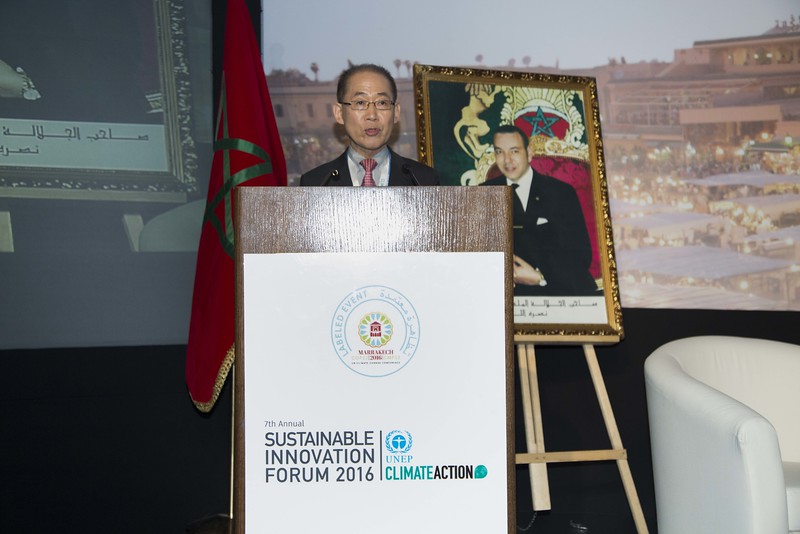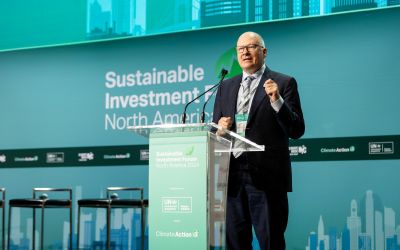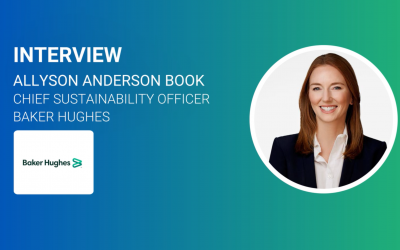The IPCC’s Scientific Assessments of Climate Change
Dr Hoesung Lee, Chair of the Intergovernmental Panel on Climate Change (IPCC), sets out the Panel’s contribution to the implementation of the Paris Agreement, and gives details of the next stages leading to the global stocktake in 2023.
The Paris Agreement, taken together with the Sustainable Development Goals of the 2030 Development Agenda and the Sendai Framework for Disaster Risk Reduction, shows how the international community can come together to meet environmental and development challenges. In this article I will examine how the Intergovernmental Panel on Climate Change is contributing to the practical details of implementing the Agreement.
The Paris Agreement makes it clear that the global stocktake – the five-yearly review of contributions and commitments by state to reach the common goal of holding global warming well below 2°C and if possible to 1.5°C – will be based on the future reports of the IPCC. And COP21 asked the Climate Panel to undertake an immediate assessment of the impacts of warming of 1.5°C and related emissions pathways, to be delivered in 2018, in time for the facilitative dialogue at COP24 on the stocktake.
The IPCC has already started work on the 2018 special report, scoping out the outlines – the table of contents and the structure – and calling for nominations of authors. The report is attracting intense interest and has kick-started activity in the research community.
Two special reports
At this point we have very little knowledge of what warming of 1.5°C means, compared with 2°C or more. We know that the survival of many small island states is vulnerable to sea-level rise, which could be initiated by warming above 1.5°C, but we need a much better understanding of what it would entail, how it would affect other parts of the world, and of the emissions pathways, including overshoots, that would take us there.
Besides the assessment of 1.5°C, governments asked the Climate Panel to prepare two other special reports – one on climate change and oceans and the cryosphere, and one on climate change, desertification, land degradation, sustainable land management, food security, and greenhouse gas fluxes in terrestrial ecosystems. The report on oceans will examine the interplay of melting ice sheets and sea-level rise, as well as the impact of climate change on important sources. The one on land-related issues will consider, among its range of topics, vital questions of food and water that are highly relevant to an understanding of how communities can survive and thrive.
Both these reports will be delivered in 2019, a year that will also see the IPCC complete an update of its methodology reports. These methodologies are produced by the Climate Panel to enable countries to measure their greenhouse gas inventories – emissions less withdrawals. After all, effective policies to control emissions depend on our ability to measure them accurately, and to compare them across countries.

AR6 and Synthesis
The full sixth assessment, or AR6, will roll out in 2021, to be capped by the Synthesis Report in 2022, in time for the global stocktake in 2023.
We will hold a scoping meeting for AR6 in May 2017, but already we can describe some key features. AR6 will pay special attention to climate change and cities, which already house half the world’s population, a proportion that will rise to two-thirds by 2050. Cities thus offer particular challenges and opportunities for mitigation and adaptation. We will co-sponsor a conference on climate change and cities in 2017 to encourage research on this topic to feed into a special report on cities in the next assessment cycle starting in 2023. The infrastructure stock of developed countries is five times that of developing countries, so it seems reasonable to conclude that efforts to tackle climate change will depend on how developing countries build out their infrastructure.
We also hope in this report to fill some of the gaps in regional knowledge. We have a good understanding now of climate change impacts at the global scale, but for policy-makers what is most relevant is the local level and we must provide that information.
Similarly, we have a broadly good understanding of the mechanics of climate change, even if there are some important areas where more understanding of climate phenomena and their causes is required. But in AR6, as the world looks to implement the Paris Agreement, we must put an emphasis on solutions as much as on basic climate science. For this reason the IPCC will be tapping social scientists, political scientists, economists and psychologists to help us understand the decision-making framework, and how policies can be delivered effectively. This in turn means grappling with questions of equity and justice, for effective policies ultimately derive from values.
One whole complex of questions that we need to examine more closely is the economics of climate change. We must look at how ecology and economy interact so that we can get a better understanding of the costs of climate change, including the costs to ecosystem services. An appreciation of the economics of climate change involves not only the costs of action, but the opportunity costs of inaction, and thus the benefits of action. One example would be the advantages in terms of healthcare and quality of life that arise from clean energy. The World Bank has calculated that air pollution costs the global economy US$5 trillion a year, with about 5.5 million lives lost to related diseases in 2013.
An understanding of these linkages can make clear why it is in countries’ own interests to avoid locking in high-carbon infrastructure as they build up power capacity, just as doing so would put the 2°C goal out of reach for the world, by burning up the remaining carbon budget.
Already we have a good idea of what we need to do to respond to the challenges of climate change, to adapt where we can, and to mitigate to ensure that adaptation remains possible. The assessments that the IPCC will produce in the coming years will build out that knowledge and provide policy-makers with the information base they need to take the necessary action.
Paths to Paris
It is worth recalling how the IPCC’s work laid the foundations of the Paris Agreement. The 200 nations that reached agreement at COP21 were able to do so because that agreement was soundly based on science. The Paris Agreement was informed through and through by the findings of the Climate Panel’s last comprehensive assessment – the Fifth Assessment Report (AR5). This was rolled out in 2013 and 2014 and presented to policy-makers and the public around a series of events, including, significantly, a series of presentations for negotiators at the UNFCCC, known as the Structured Expert Dialogue. That gave negotiators the opportunity to drill down into the detail of AR5 in discussion with the authors, allowing them a solid and in-depth understanding of the science and its implications.
Read the full Climate Action 2016/17 Publication here








